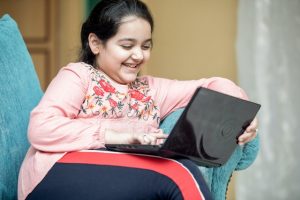
Empowering Education: Exploring UK Online Secondary Schooling
Online education has made learning flexible and accessible. UK online secondary schools give pupils many perks and prospects. In this post, we’ll explore online secondary school uk benefits, curriculum, teaching techniques, and distinctive features that empower pupils.
- Flexible Education
UK online secondary education offers freedom. At our Thomas Keith Independent School, pupils have the freedom to learn from the comfort of their own homes, allowing them to tailor their studies to their specific needs and schedules. They can design their own study timetables, allowing them to balance academics with extracurriculars, part-time employment, and family obligations. - Curriculum Variety
UK online secondary schools offer a variety of curriculum options to meet various educational goals. Our diverse curriculum at Thomas Keith Independent School covers a wide range of subjects, including English, mathematics, physics, humanities, computer science, languages, and the arts. This ensures a well-rounded education for our pupils. Online schools that follow the UK National Curriculum provide a well-rounded education.

- Supported Learning
UK online secondary education emphasises personalised learning and support. Our dedicated teachers at Thomas Keith Independent School provide individualised attention to each pupil, thanks to our small class sizes. This personalised approach creates a supportive learning environment where pupils can thrive and reach their full potential. Online teachers are skilled at responding to pupils’ needs and learning styles. This personalised approach creates a supportive learning atmosphere and lets pupils advance at their own pace, ensuring they understand topics and attain their full potential. - Interactive Learning Resources
Online secondary schools use interactive learning tools to engage and comprehend pupils. Educational movies, quizzes, virtual experiments, and simulations make learning more engaging. Online schools use technology to engage pupils and foster critical thinking, problem-solving, and curiosity. - Learning Together
Contrary to popular belief, UK online secondary education encourages collaboration. Virtual classrooms, discussion boards, and group projects allow pupils to collaborate, share ideas, and have meaningful dialogues. These platforms stimulate communication and teamwork, preparing pupils for academic and professional success. - Qualified, Dedicated Teachers
UK online secondary schools hire devoted and trained online education teachers. Our team of highly qualified and dedicated teachers at Thomas Keith Independent School leverage technology to deliver live and interactive lessons that actively support and guide our pupils’ learning journey. They provide academic support and encouragement through personalised feedback, advice, and mentorship. Devoted teachers build solid teacher-pupil relationships and facilitate good learning. - Complete Feedback
Online secondary education requires assessment and feedback. Online schools assess pupils through quizzes, examinations, projects, and essays. Pupils receive timely and detailed feedback on their strengths and weaknesses. This feedback helps pupils learn, reflect, and think critically. - Technology and Digital Literacy
Online secondary education gives pupils valuable technological and digital literacy abilities. Online platforms, communication tools, and digital resources let pupils navigate virtual worlds, collaborate digitally, and employ technology for learning. These skills improve digital literacy and prepare them for university and careers. - Fostering Learning
UK online secondary schools foster a supportive learning community. They set up email, video conferencing, and chat rooms for regular teacher-pupil-parent communication. Virtual events, organisations, and extracurricular activities give online pupils a sense of belonging and possibilities for socialisation, teamwork, and personal growth. - Effortless Transition to University
UK online secondary schooling eases the transition to university. Academic preparation, including exam preparation and coaching, helps pupils pursue their goals. Online schools help pupils choose courses and universities for their applications. Online secondary schooling prepares pupils for tertiary-level independent study and self-discipline.

UK online secondary education empowers pupils. Online schools offer a high-quality education that fulfils pupils’ needs and objectives with a diversified curriculum, individualised learning, interactive materials, devoted teachers, and a supportive learning community. Pupils are prepared for further education and beyond through extensive evaluation and feedback, technological proficiency, and digital literacy. Online secondary learning in the UK is still a good option for pupils who want a flexible, creative education.
As UK virtual learning grows, online safety and etiquette must be prioritised. Online education poses risks and obstacles for pupils and teachers. This article discusses UK virtual learning environments’ recommended practices for online safety and etiquette.
- Clear Online Conduct Rules
Safe and courteous online learning requires explicit online behaviour norms. Teachers should set expectations for pupil behaviour, including proper language, polite communication, and ethical behaviour. Cyberbullying, plagiarism, and other online misbehaviour should be taught to pupils. Clear expectations help pupils create a positive online environment. - Maintain Privacy
Online learning requires privacy. Pupils should be taught to protect their full names, addresses, and contact information. Educators should safeguard and encrypt virtual learning communication systems to prevent unauthorised access. Emphasising privacy and digital safety, pupils should avoid sharing personal information online or with strangers. - Teach Digital Citizenship
Digital citizenship involves respect, responsible technology use, and healthy online communities. Teachers should teach digital citizenship, netiquette, and digital footprints. Digital citizenship teaches pupils to responsibly navigate virtual places, critically consume online content, and positively contribute to online dialogues. - Online Communication Etiquette
Proper communication etiquette is essential for virtual learning. Pupils should be encouraged to write and speak professionally. Emphasise netiquette rules such as not using all caps (shouting online) and not using abusive words or insulting comments. To create a courteous and inclusive virtual learning environment, educators can model and teach online communication. - Promote Device Responsibility
Responsible gadget use helps pupils focus in virtual learning environments. Educators should stress the necessity of a tidy, distraction-free workspace. Pupils should be urged to limit screen time and multitask. Virtual teachers can demonstrate ethical gadget use by using solutions that boost productivity and reduce distractions.

- Teach Cybersecurity
Cybersecurity dangers and good security practices should be taught to pupils. Pupils should learn about phishing, malware, and other internet concerns. Encourage strong passwords, two-factor authentication, and software and antivirus updates. Teachers can teach pupils cybersecurity practices to secure themselves and their gadgets. - Report Misconduct
Pupils’ participation and vigilance create a safe virtual learning environment. Encourage kids to report inappropriate behaviour, cyberbullying, and harassment. To make kids feel comfortable reporting concerns, set up anonymous reporting channels or designated contact persons. Educators should act quickly to confront wrongdoing and protect kids. - Parental Support
Online learning safety requires parental involvement. Educators should discuss online safety with parents and offer resources to encourage appropriate online behaviour at home. Parents may monitor, control, and discuss online safety with their children. Educators and parents working together foster responsible online behaviour and a safer online learning environment.
As UK education embraces virtual learning, internet safety and etiquette are crucial. Pupils can safely traverse virtual learning settings by setting explicit online conduct rules, protecting personal data, developing digital literacy, and encouraging responsible device use. Digital citizenship, online communication etiquette, and online safety must be taught and supported by educators and parents. Online safety and etiquette may make virtual learning positive, inclusive, and powerful for UK pupils.







